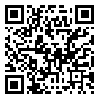دوره 18، شماره 1 - ( 1-1399 )
جلد 18 شماره 1 صفحات 90-81 |
برگشت به فهرست نسخه ها
Download citation:
BibTeX | RIS | EndNote | Medlars | ProCite | Reference Manager | RefWorks
Send citation to:



BibTeX | RIS | EndNote | Medlars | ProCite | Reference Manager | RefWorks
Send citation to:
Akbari Manie R, Tarameshlou M, Izadifar R, Maroufizadeh S, Jalilevand N. Wh-Questions' Expression in Persian-speaking Children: A Comparison Between Spontaneous and Elicited Probes. Iranian Rehabilitation Journal 2020; 18 (1) :81-90
URL: http://irj.uswr.ac.ir/article-1-1031-fa.html
URL: http://irj.uswr.ac.ir/article-1-1031-fa.html
Wh-Questions' Expression in Persian-speaking Children: A Comparison Between Spontaneous and Elicited Probes. مجله انگلیسی زبان توانبخشی. 1399; 18 (1) :81-90
چکیده: (5298 مشاهده)
Objectives: Studies have shown that most children before the age of 5 are capable to comprehend and express wh-questions in daily conversations. This study aimed at comparing the ability of wh-questions’ production in 4-6-year-old children in spontaneous and elicited conditions.
Methods: In this descriptive-analytic study, 72 (n=72) 4-6-year-old Persian-speaking children were selected randomly from kindergartens of Hamadan, Iran. Three different probes were used to evaluate the spontaneous and elicited conditions in the expression of questions with “what, where, who, why, and when”. In the first probe, children were encouraged to ask questions spontaneously about experimental pictures. While in the second probe, the verbal prompt was presented about wh-questions, and wh-words were provided as key-words in the third probe. Repeated measures analysis of variance test with between-subjects’ factors of sex (male, female) and age group (4-5 years, 5-6 years) and within-subjects’ factor of the method (I, II, III) was performed in the study.
Results: There was a main effect of probes in “where, who, and when” questions and the mean scores of the II and III probes were significantly higher than those of probe I. Children in probe I received higher scores for why questions than the other probes. “What” questions were expressed more by children in probe II. “Why, when, and where” scores were significantly higher for 5-6 years group than for 4-5 years group. There was no significant effect on all wh-questions.
Discussion: The higher accuracy of wh-questions in probe II and III compared to probe I suggested that this competence is significantly developed by the use of elicited procedures (verbal prompt or providing wh-words as key-words) in comparison with no elicitation.
Methods: In this descriptive-analytic study, 72 (n=72) 4-6-year-old Persian-speaking children were selected randomly from kindergartens of Hamadan, Iran. Three different probes were used to evaluate the spontaneous and elicited conditions in the expression of questions with “what, where, who, why, and when”. In the first probe, children were encouraged to ask questions spontaneously about experimental pictures. While in the second probe, the verbal prompt was presented about wh-questions, and wh-words were provided as key-words in the third probe. Repeated measures analysis of variance test with between-subjects’ factors of sex (male, female) and age group (4-5 years, 5-6 years) and within-subjects’ factor of the method (I, II, III) was performed in the study.
Results: There was a main effect of probes in “where, who, and when” questions and the mean scores of the II and III probes were significantly higher than those of probe I. Children in probe I received higher scores for why questions than the other probes. “What” questions were expressed more by children in probe II. “Why, when, and where” scores were significantly higher for 5-6 years group than for 4-5 years group. There was no significant effect on all wh-questions.
Discussion: The higher accuracy of wh-questions in probe II and III compared to probe I suggested that this competence is significantly developed by the use of elicited procedures (verbal prompt or providing wh-words as key-words) in comparison with no elicitation.
نوع مقاله: پژوهشي |
موضوع مقاله:
گفتار درمانی
دریافت: 1398/3/10 | پذیرش: 1398/7/18 | انتشار: 1398/12/11
دریافت: 1398/3/10 | پذیرش: 1398/7/18 | انتشار: 1398/12/11





